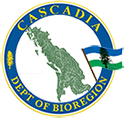KLAHANIE
[KLA’-ha-nie], [KLA’-a-ni], or occasionally [klagh-anie’] — adverb
Meaning: Out; outside; outdoors; without; exterior.
Origin: Chinook tlakhani “out”; “outside”.
‘Klahanie’ (sometimes rendered as ‘klahani’, ‘klahhanie’, or ‘klaghanie’) means ‘outside’, but can be used to describe a variety of actions relating to the external, such as “mamook klahanie okoke” (put that outside), “chako klahanie” (to emerge from; to come out from; to be delivered), and “mahsh klahanie” (to throw out; eject). One mgiht be eager to get “klahanie kopa house” (out of the house) for a bit, or someone might suggest “klatawa nesika klahanie kopa town” (let us go away from the city) as a prelude to a camping trip. Be careful with your phrasing though. If you’re “klahanie”, you’re ‘outside’, but to “klatawa klahanie” or “go klahanie”, it can mean you’re on your way to a “klahanie house” (restroom; outhouse).
Klahanie is often used in place names for “the great outdoors”; There’s a Klahanie Road on the way to Whistler, BC, a Klahanie Lodge in Port Angeles, Washington, and Klahanie, Washington is planned community between the cities of Sammamish and Issaquah.
Klahanie was also the title of a popular 35 minute-long TV series on the CBC about the wilderness and outdoor activities, while also taking viewers to see some of the flora and fauna of some of the most beautiful and inaccessible parts of the world. Attention was also given to the subject of environmental conservation and protection, as well as to skills required for survival in some of the more rugged realms of nature in the world. Originating in Vancouver, BC and produced by Andy Snider, the longtime popular program aired from 1967-1978, first being hosted by Bob Fortune [1967-1972] and later by Don White [1972-1978].
<div class="sqs-video-wrapper" data-provider-name="" data-html="<iframe src="//www.youtube.com/embed/2niiqDKKoX8?wmode=opaque&enablejsapi=1" height="480" width="854" scrolling="no" frameborder="0" allowfullscreen="">
</iframe>”>



Post a comment